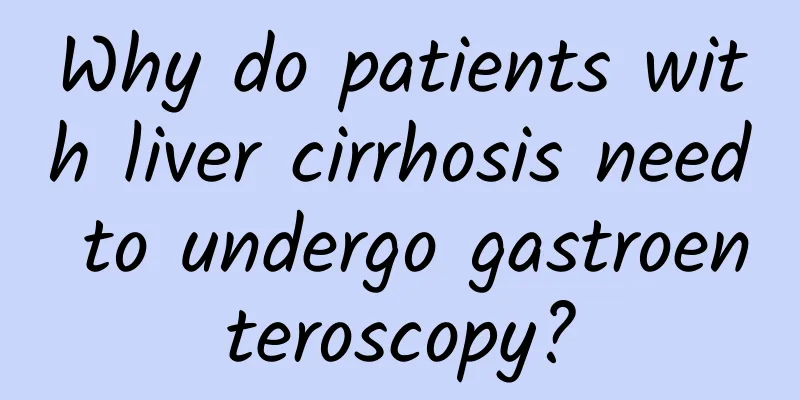Why do patients with liver cirrhosis need to undergo gastroenteroscopy?

|
Cirrhosis is a common chronic liver disease. As the disease progresses, it may affect the normal function of the gastrointestinal system. Therefore, it is necessary for patients with cirrhosis to undergo gastrointestinal endoscopy. This article will introduce in detail the relationship between cirrhosis and gastrointestinal lesions, the application of gastrointestinal endoscopy in diagnosis and treatment, special considerations for patients with cirrhosis, precautions during the examination, the limitations of gastrointestinal endoscopy in the treatment of cirrhosis, and other related examination methods. 1. Liver cirrhosis and gastrointestinal diseases Patients with liver cirrhosis often have gastrointestinal mucosal congestion, edema, erosion, ulcers and other lesions. These lesions can cause symptoms such as abdominal distension, acid reflux, belching, nausea, vomiting, and in severe cases, may also lead to bleeding, perforation, pyloric obstruction, etc. Through gastroenteroscopy, the lesions of the gastrointestinal mucosa can be visually observed, providing an important basis for diagnosis and treatment. 2. Application of gastroenteroscopy in diagnosis and treatment Gastroenteroscopy is a very effective diagnostic and therapeutic method that can be used to observe gastrointestinal mucosal lesions, take tissue biopsies, and treat gastrointestinal lesions. In patients with cirrhosis, gastroenteroscopy can be used for the following: (1) Diagnosis: Through gastroenteroscopy, the morphology, color, texture, etc. of the gastrointestinal mucosa can be observed, and tissue biopsy can be performed to determine the nature and extent of the lesions. (2) Treatment: Gastroenteroscopes can be used to perform therapeutic procedures such as hemostasis, stent placement, and pyloric dilation, which have a good effect on symptoms such as gastrointestinal bleeding and pyloric obstruction caused by cirrhosis. 3. Special considerations for patients with cirrhosis When patients with cirrhosis undergo gastrointestinal endoscopy, the following special factors need to be considered: (1) Portal hypertension: Patients with liver cirrhosis often have portal hypertension, which may lead to esophageal varices, gastric varices and other problems. When performing gastrointestinal endoscopy, it is necessary to choose appropriate examination methods and techniques to avoid inducing complications such as bleeding. (2) Upper gastrointestinal bleeding: Patients with cirrhosis are prone to upper gastrointestinal bleeding, and gastrointestinal endoscopy may induce or aggravate bleeding. Therefore, before the examination, the patient's medical history should be carefully understood, the risk of bleeding should be assessed, and appropriate preparations for hemostasis should be made. 4. Things to note during the inspection When performing a gastrointestinal endoscopy, you should pay attention to the following: (1) Laryngeal anesthesia: Before undergoing gastrointestinal endoscopy, the patient needs to undergo laryngeal anesthesia to relieve discomfort. After anesthesia, the patient should lie flat with the head tilted back to keep the airway open. (2) Gastrointestinal decompression: Before undergoing a gastrointestinal endoscopy, you should stop eating and perform gastrointestinal decompression to relieve uncomfortable symptoms such as abdominal distension and acid reflux. During gastrointestinal decompression, you should pay attention to maintaining oral hygiene. (3) Monitoring of vital signs: During the examination, the patient's vital signs, such as blood pressure, heart rate, and blood oxygen saturation, need to be monitored to ensure patient safety. Summarize It is very necessary for patients with cirrhosis to undergo gastrointestinal endoscopy, which can observe gastrointestinal mucosal lesions, perform tissue biopsies, and treat gastrointestinal lesions. However, special considerations such as portal hypertension and upper gastrointestinal bleeding should be taken into account during the examination. It is recommended that patients with cirrhosis choose appropriate examination methods under the guidance of a doctor so as to detect and treat gastrointestinal lesions in a timely manner. |
<<: Can diabetes cause blindness? It's true!
>>: Popularize the early screening of cervical cancer
Recommend
Will my temperature rise when I'm pregnant?
Those who want to have children after marriage mu...
Will crossing your legs have any effect during pregnancy?
Pregnancy is the most important stage of a woman&...
Can scanty menstruation lead to infertility? See the answers from authoritative experts
Small menstrual volume is a manifestation of irre...
What to do with postpartum urinary incontinence? Physical therapy is good
Many women experience some embarrassing phenomena...
How to supplement iron deficiency anemia during pregnancy
For ordinary women, it is actually very easy to d...
Can Thai foot patches be used during breastfeeding?
For women who are breastfeeding, there may be man...
Is it normal to have red urine during pregnancy?
There are many reasons why urine may be a little ...
What should I do if I have some bleeding during sex?
In life, some women will have some vaginal bleedi...
How is the vaginal ring inserted?
The male penis is a very important part of the ma...
Can I eat mung bean sprouts during menstruation?
Mung bean sprouts are a common vegetable in our l...
How to regulate irregular menstruation caused by endocrine disorders
Menstrual disorders, a common gynecological disea...
What if my period comes 10 days early?
Women of childbearing age have their menstrual pe...
Is bright red menstruation better or dark red?
Women spend sixty days out of the 365 days of a y...
Can I still breastfeed when I'm pregnant?
Having a second child is popular now, so most mot...









